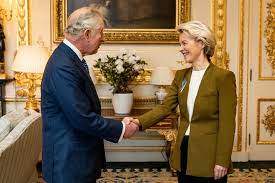Mohamed Chebaro
The UK’s King Charles III last week drew criticism from many on the right of the ruling Conservative Party for welcoming European Commission President Ursula von der Leyen at Windsor Castle. Her visit concluded a busy schedule in England, where she finalized with Prime Minister Rishi Sunak a new deal aimed at streamlining trade between Northern Ireland and the UK, dubbed the Windsor Agreement. This came after months of uncertainty, which had threatened to cause the collapse of the Good Friday Agreement, as the Northern Ireland protocol of the EU-UK Trade and Cooperation Agreement that governs the UK’s exit from the bloc caused political and economic friction in the province and put at stake its future status within the union.
Though Buckingham Palace defended the meeting, saying that Charles was acting on “the government’s advice,” it was considered by some to be “constitutionally unwise” and it angered unionist parties, as well as the euroskeptic tribe of the Conservative Party. Leading Conservative Brexiteer Jacob Rees-Mogg said it was wrong to involve the king in the “immediate political controversy” on the day Sunak signed the new agreement with the EU. If the picture of the king warmly shaking hands with Von der Leyen at Windsor, where she was offered tea and discussed Ukraine, climate change and maybe Northern Ireland, caused controversy, I will not need to wait to see what kind of reception Charles’ forthcoming trip to France and Germany (his first state visits since becoming king) will get back home.
The wiser branch of the Conservatives should, in my opinion, use the clout Charles has developed over the years to help heal tensions between the UK and EU. Only a close relationship with Brussels can turbocharge the UK’s recovery from its Brexit-inspired slump, which has seen the country’s growth performance dwindle to levels that have left its economic prospects for this year ranked second-last in the G20, only ahead of Russia.
The king and Camilla, the queen consort, will make a six-day trip to France and Germany at the end of this month. Charles will become the first UK monarch to give a speech from France’s Senate chamber and to address Germany’s Bundestag. The schedules for both visits, as described by Buckingham Palace, are aimed at celebrating Britain’s relationship with France and Germany, “marking our shared histories, culture and values. It is also a chance to look forwards and show the many ways our countries are working in partnership, whether that be to tackle climate change; respond to the conflict in Ukraine; seize trade and investment opportunities or share the best of our arts and culture.” Charles’ schedule will include meetings with both heads of states and, aside from the ceremonials, will include engagements that can only be frowned upon by parts of the anti-EU political class in the UK, especially if he chooses to address the members of parliament and senators in Paris in French. He will surely touch on everything that unifies and puts the UK at the heart of Europe despite Brexit.
He is due to meet with members of the British community in Bordeaux, where he will inaugurate a new British consulate building. In addition, he will tour areas south of the city that were ravaged by wildfires last summer, reminding everyone of the king’s long-lasting campaigns to protect the environment. In Germany, Charles is set to meet refugees recently arrived from Ukraine and hear about the support the country provides for them, while the UK itself chooses to leave it to the hospitality of its own citizens to welcome only pre-approved refugees. The UK of the past few years, led by the Conservatives’ hard-line, anti-European government, has made bashing the EU a national sport, despite the self-harm inflicted on the nation’s finances and the obstacles caused by Brexit for the manufacturing, farming, fishing and financial services industries. These sectors have, for decades, served clients across the EU, helping the growth and prosperity of the UK and keeping the country in the list of the top five or six largest economies in the world.
It is not a secret in the UK that the head of state, who traditionally remains politically neutral, is a europhile who is likely to always be at odds with the advocates of “taking back control” and “Singapore-on-Thames.” It is customary for the king to only meet world leaders, whether at home or abroad, if the government advises him to do so. One wishes that this government could try to recalibrate its compass and see the benefits of ensuring a smoother relationship with the countries of the bloc next door. The royal household could help in this endeavor as, for centuries, Britain has been global, European and Atlanticist. But with Brexit and the rise of the desire to close its borders to immigration and allow anti-European sentiments to flourish, the UK is risking it all and losing its way as a leading European and global force.







